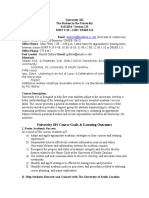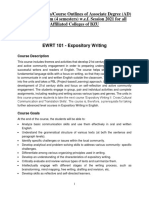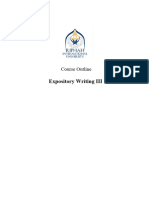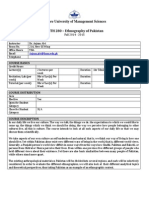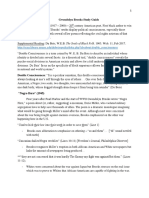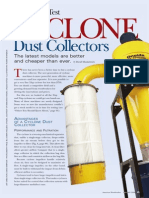SKILLS FOR ACADEMIC SUCCESS
LS101 – 2024
Instructor Name: Patrick Thoendel
Instructor Email: patrick.thoendel@fulbright.edu.vn
Please note that I only read or respond to emails during working hours.
Please expect roughly 24 hours for a reply on emails. If you send me an
email too late in the day on Friday, I will respond to you on Monday
morning.
Class Date and Time
Mondays
Broadway MD (Yellow room!)
9:45-11:15
Office Hours
Since the teachers for this course are all Learning Support team members,
the process for booking office hours is a bit different from other faculty.
You can book a session on the Learning Support Booking App at any
available time that is convenient for you. Please note in the booking that
you would like to meet to discuss this course
Make an appointment here: Learning Support Booking App
Course Description
The content of this course comes from observations from several years of
FUV first-year student experience. Over the years we have noticed two
broad patterns that affect students’ academic success at FUV. The first
pattern we have noticed is that often students have some understanding of
the academic skills they need to succeed but don’t derive much benefit
from them. We have observed that even though students self-study with
Coursera or YouTube their knowledge and experience with the skills remain
superficial. They rarely apply these skills systematically early on during their
time at FUV. The second pattern we have noticed is one of mindset.
Students in their first year often struggle with adopting a mindset and
approach to learning at FUV that will facilitate their academic success.
Sometimes students may not even realize that their mindset is an issue
until they are overwhelmed with frustration. This course takes these two
patterns as the foundational assumption for all students. You have some
superficial understanding of academic skills but struggle to apply these skills
�systematically and you will need some coaching to adapt your mindset to
one more conducive to a liberal arts environment.
This course is designed to support newly enrolled FUV students
transitioning from a traditional model of education to a liberal arts
curriculum. Through large group sessions and practical exercises, you will
develop fundamental academic skills, including academic writing, study
techniques, and critical thinking. The course is intended to be taught during
a student’s first semester and to reinforce the content of the Core
curriculum. In addition to introducing, you to the fundamental skills you will
need to succeed at Fulbright, the course will aim to demystify the liberal
arts approach to learning. The course will make substantial use of
metacognitive learning techniques, reflective writing, and critical self-
assessment; to help you engage critically with your learning during the first
semester so you can be more successful during the rest of your learning
journey at Fulbright.
The ”flow” of this course is designed to match the trajectory of a “typical”
first-year FUV student, and will hopefully directly support you in all courses
you are enrolled in. Since all first-year students will be required to take
Global Humanities, this course will be a common reference point for all
students. However, you will be exposed to more than just Global
Humanities during your first semester, you could be taking Exploring the
Past, Computer Science, or even Intro to Visual Studies. Our aim is to give
you an introduction to academic skills and then provide you with
encouragement and accountability so you can apply these in all of your first
semester classes. Our ambitious goal is that you will learn a lot in this class
and consequently enhance your learning in all your other classes as well.
Course Learning Objectives (CLO)
• CLO 1: Become familiar with the basics of academic writing, including
essay structure, thesis statements, summarizing & paraphrasing, and
citation.
• CLO 2: Learn effective study strategies, time management techniques,
and note-taking skills.
• CLO 3: Enhance abilities to analyze information, evaluate arguments,
and engage in thoughtful discussions.
• CLO 4: Learn strategies to manage heavy reading loads across
disciplines, optimize comprehension, and extract key information.
Assessments
• Participation and attendance: 20%
Attendance and participation in all sessions is mandatory. Participation
includes both in class discussion and online discussion, students will be
expected to participate in both. Students will be allowed 2 excused
2
� absences per semester. An excused absence is an absence where the
student is in touch at least 24 hours before class time and presents a
reasonable explanation for the absence. If students are absent from
class they are required to post and engage in the online discussion
that week.
• Learning Reflections (4 assignments):20%
- Every two to three weeks, students will complete a 500-word
reflective task. They can choose from a set of reflective questions
provided by the instructor. These reflections will be submitted via
Canvas.
- Purpose: These reflections will encourage self-assessment, critical
thinking, and engagement with course material. Reflection is an
important metacognitive technique and getting into the habit of doing
it will help you be better learners.
• Midterm Assignment Analysis:30%
- Students will analyze a previously graded written assignment from
another course. They will:
➢ Engage with the professor’s feedback.
➢ Create a reverse outline based on their revised assignment.
➢ Use this outline to inform their reflection and guide their
improvement as writers.
➢ The analysis will be summarized in a 500-word reflection.
- Purpose: By engaging with a completed assignment and professor
feedback in a critical way students will enhance writing skills and
promote thoughtful revision. Essentially this assignment is a chance to
systematically reflect on how you will improve.
• Final Project/Presentation:30%
- Future Action Plan Presentation:
➢ Students will synthesize their writing, reflections, and analyses
from the course.
➢ They will create a future action plan for the remainder of their
first year at Fulbright.
➢ Expectations: Utilize skills acquired during the course to set
meaningful goals.
- Purpose: The final step of being an active learner is to make a plan to
apply your learning. Rather than an exam, your final assignment for
this course will be to prepare a future action plan and present it to the
class. This activity will foster long-term planning and application of
learning.
3
� TENTATIVE COURSE CALENDAR
Time Content
Week 1 (Aug 19) Course overview, expectations, and setting intentions
Week 2 (Aug 26) Effective note-taking
Week 3 (Sep 2) National holiday
Week 4 (Sep 9) Active reading
Week 5 (Sep 16) Recognizing multiple perspectives in reading
Week 6 (Sep 23) The writing process
Week 7 (Sep 30) Essay structure
Week 8 (Oct 7) Using your own words
Break We Week
Week 9 (Oct 21) Evidence types and sources
Week 10 (Oct 28) Introduction to Critical thinking
Week 11 (Nov 4) Introduction to Research components
Week 13 (Nov 18) Critical evaluation of sources
Week 14 (Nov 25) Ethical considerations
Week 15 (Dec 2) Final Presentation
Academic Dishonesty
As Fulbright University’s Code of Academic Integrity explains: “plagiarism
occurs when a writer appropriates another's ideas, research, or writing
without proper acknowledgement of the source or uses another's words
without the use of quotation marks, whether intentional or not.” All
Fulbright students are responsible for familiarizing themselves with the
Student Code of Conduct as of Aug 2023. In order to help students become
familiar with the concepts of academic integrity, citation, and plagiarism, all
students are required to complete Level 1 (October 12 th 2024) and Level 2
(November 29th 2024) of the Academic Integrity Credential (available on
4
�Canvas). Academic misconduct (including plagiarism, cheating, and other
violations of the Code of Academic Integrity) will be investigated according
to this code and may be subject to sanctions including reduced grade,
failure, academic warning, academic probation, academic suspension, or
withholding of degree. If you have questions about plagiarism, you should
contact your teacher or the Learning Support Team at
learningsupport@fulbright.edu.vn .
This course will have a zero tolerance policy for plagiarism. Students are
responsible for ensuring that their submissions do not contain intentional
or unintentional instances of plagiarism.
Note on Use of AI
This class follows the current student code of conduct guidelines on use of
AI tools: Student Code of Conduct as of Aug 2023
To be honest, this course is to practice, reflect and deepen knowledge of
skills. While some skills we will learn could be done for you by AI, you would
be doing yourself a disservice by using AI to complete the assessments in
this course. All our assignments are personalized and reflective. The kind of
vague impersonal language that generative AI produces would be
immediately apparent to any reader. Additionally, use of AI would be a
clear indicator that the student didn’t grasp the nature of the “mindset
shift” required to succeed in this course. AI could possibly help you with the
result, but not help you learn the process to get that result.
Learning Support
Please remember that “Help is always available at FUV, if you just reach
out!”. There are ample resources available to help you survive and thrive on
your academic journey. You are fortunate since this class is being taught by
the learning support team, you can very easily access the help you may
need simply by raising your hand.
Wellness Center
The Wellness Center support students to take care of your emotional and
social health and wellbeing so you can enjoy your college experience more
fully. Our offers include various wellness programs, free counseling service,
safer community, and accessibility service for all Fulbright students.
You can contact the Wellness Center via wellness@fulbright.edu.vn or find
us at the Wellness Center office on the Level 5 of our Crescent campus.
Counseling service
If you are experiencing any stress or emotional concern that may be
interfering with your ability to perform academically, or you want to
explore more about mental health and how to live life in a more balanced
way, you can contact the Wellness Center Counseling service.
5
�Our counseling service is confidential, private, and free of charge for all
Fulbright students. You can book a counseling session at this link or
contact counseling@fulbright.edu.vn. If you need urgent support, you can
contact the International SOS via their hotline (+84 28 38298520) or access
their mobile app.
Safe Learning Environment
Fulbright is dedicated to a safe, supportive and non-discriminatory learning
environment. Bullying, abuse, discrimination, harassment, sexual
misconduct, and any other actions that create an unsafe learning
environment will not be tolerated. It is the responsibility of all students to
familiarize themselves with the Student Code of Conduct. Actions which
threaten a safe campus environment - including the physical and emotional
safety all students - will be investigated according to this code and may be
subject to sanctions including loss of privileges, suspension, or expulsion
from FUV.
The Wellness Center offers Safer Community - a central point of enquiry,
response, and support for concerning, threatening, or inappropriate
behaviors, including sexual harassment, sexual assault, and/or any actions
mentioned above. If you are feeling unsafe or unsure what to do, Safer
Community will listen to you and explore options with you. Conversations
are confidential unless you give your consent to involve others. You can
book an appointment with Safer Community here or contact them at safer-
community@fulbright.edu.vn for any query.































